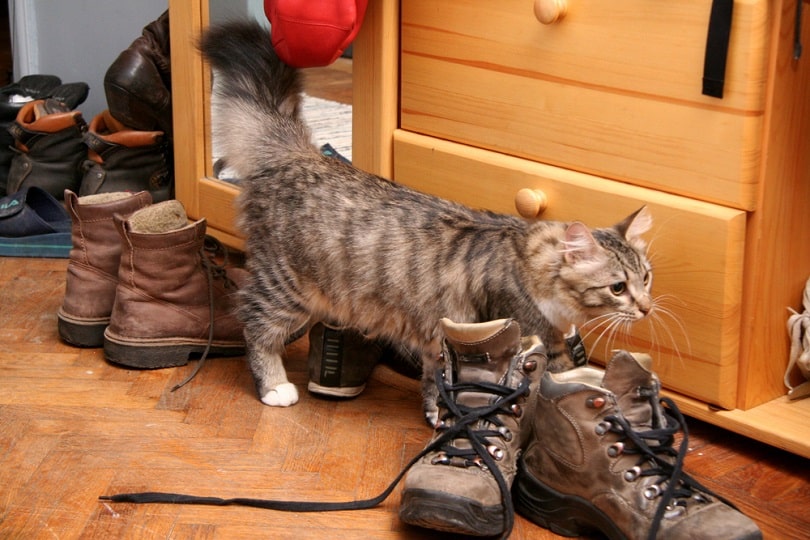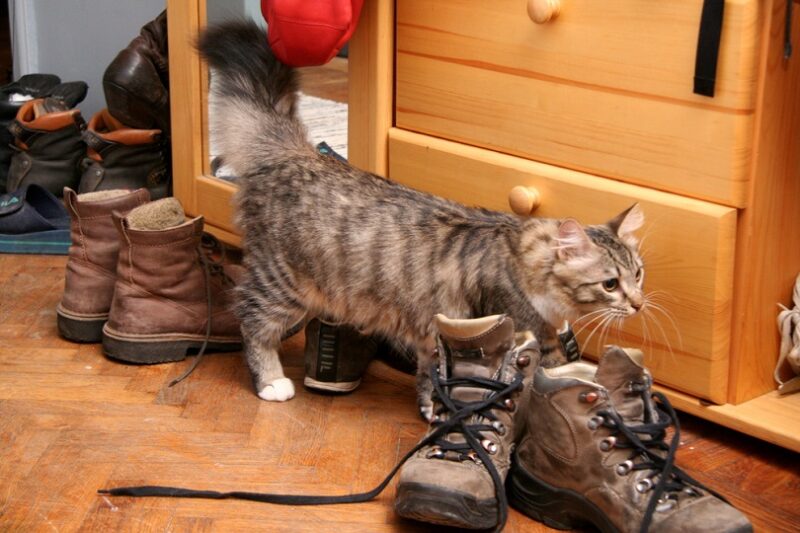Click to Skip Ahead
Nothing is worse than slipping your feet into a pool of cat pee—in your own shoe. If your cat has made a habit out of weeing into your Nikes, you’re looking for solutions. But before you can stop the problem, you have to figure out why it’s happening.
It’s difficult sometimes that we can’t just ask our cats what the deal is. So, if your cat won’t quit and you’re sick of washing your shoes, here are seven reasons they might be doing it. And there are solutions for the problem, too. Hopefully, this is a one-stop shop for your urine problem.
Cats & Bathroom Etiquette
Cats start using the litter box incredibly early in their lives. You can start introducing a kitten to its litter box at only three weeks old. Felines naturally want to cover up their urine and feces. So, when they start going to the potty out of their box, it should be an automatic signal for concern.
Several things contribute to peeing out of their designated space, and most of these problems are easily resolvable. There are plenty of resources you can try out or products you can buy to deter cat peeing—like sprays and neutralizers—to end this unwanted behavior.
Let’s talk about the main reasons your cat might be sprinkling on your sneakers.
The 7 Reasons Why Cats Pee on Shoes
1. Your Cat Might Have an Underlying Health Condition
Several health conditions can change overall behavior—including bathroom habits.
- Urinary tract infection
- Bladder infection
- Kidney disease
- Diabetes
- Arthritis
You can rule out any health conditions alongside your veterinarian. Getting the cat checked by the vet sooner will generally result in an easier treatment. Some of these issues are easily treatable with an antibiotic or other routine medication. Others require long-term or even lifelong medication.
2. Your Cat Might Be Stressed Out
Stress can cause all sorts of bad side effects that present in all kinds of crazy ways. If your cat is trying to communicate an issue, it might transpire into peeing in shoes or on other items. But it might also be something small, like hearing an unfamiliar neighbor dog barking close by or even smelling another cat around. Cats have terrific senses of smell; they can detect things you can’t.
This situation might be even more plausible if you have your shoes sitting by an outside door. It’s an opportunistic spot for them to leave their mark—warding off any potential furry intruders.
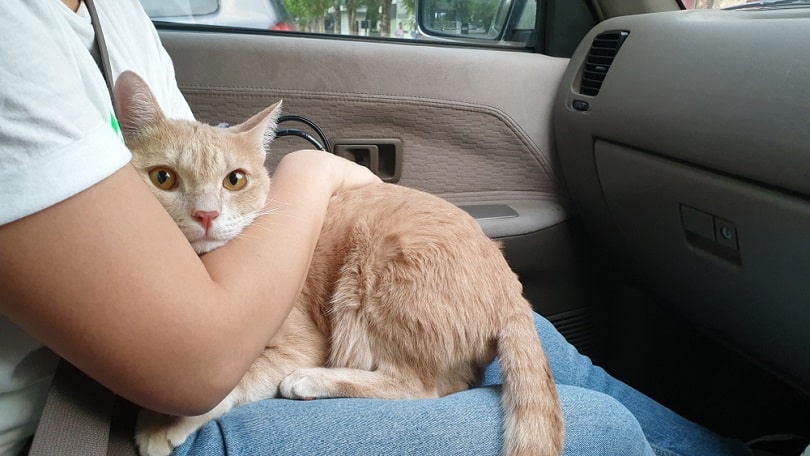
3. Your Cat’s Routine Might Have Changed
Did anything change around the household recently? If you switched up the routine, your cat might have trouble adjusting. Like peeing outside of the litter box, odd behaviors can be a response to uncertainty if they can’t grasp what’s happening around them.
Significant changes like new pets and moving can sometimes be a trigger. But it might also be something as small (to you) as changing the location of their litter box. It could even be that your hours changed at work and you aren’t home when they think you should be.
If you realize that you have made changes, you can try placing a second litter box near your shoes while making sure your shoes are not accessible to the cat. With time, the cat will get used to the new place or routine. Then, slowly and gradually move the new litter box towards a place where it is more suitable to keep. Once the cat has made a habit of urinating in the litter box, give it enough time before you place your shoes back into their original place.
4. Your Cat Might Have a Problem With Another Household Pet
Do you have a few animals that don’t get along right now? Have you noticed any friction? If your cat has a problem with another pet in the home, they might be trying to communicate how they feel. While it isn’t toward you, your belongings might be in the crossfire.
If they do have beef with a roommate, their body language will light up bright in other areas. You might see them growling, swatting, or acting displeased when the pet is around. It can indicate that they think the home is theirs and the guest is entirely unwanted.
You have to be careful with this one, too. If two cats compete against one another, they might start peeing over the same spots to dominate the other’s scent. If you suspect this might be happening, be on the lookout for other areas like bedding, doors, closets, and laundry piles.
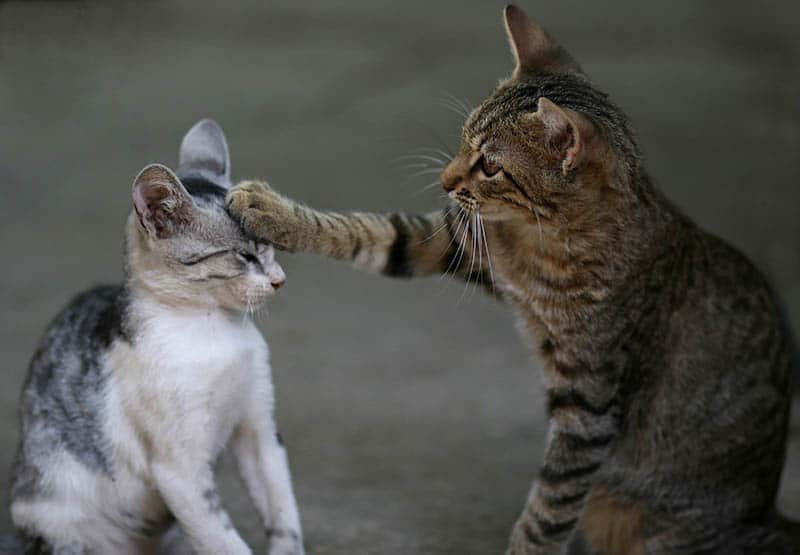
5. Your Cat’s Litter Box Could Be Dirty
If you have been a little busier than usual lately, your cat might not appreciate your lack of janitorial duties. If your cat is trying to make a statement about their unsanitary bathroom conditions, they might be peeing in your shoes to get your attention.
Some cats might even start using the bathroom right outside of the entrance to let you know that the box wasn’t suitable for use. Cats can be very picky, and some can be unrelenting when it comes to compromising.
Keep the litter box as clean as possible, scooping it out several times a day—if necessary. You might even try to change the litter entirely. It can be a particularly challenging situation in multi-pet households, but some companies manufacture self-cleaning litter boxes that might be more effective.
6. Your Cat Might Have a Litter Allergy
Some perfumes or scents can irritate your cat, which causes adverse reactions. They might also have a sensitivity or irritation to the dust produced by clay litter. Some commercial litters can have toxins or irritants in them, like chemicals, dyes, and fragrances.
If they have an allergy, they might want to limit their trips inside as much as possible—unfortunately, your shoes might be the next best place.
- Sneezing
- Irritation around paws
- Watery eyes
- Avoidance of the litter box
- Puffy face
It’s possible that you need to switch to a fragrance-free, natural base litter to see if it improves these signs. There are chemical-free, odorless alternatives that are much easier on the senses.
Allergies might not stem from the litter, though. Confirm with your veterinarian if you suspect a litter allergy is to blame. You’ll have to be patient while you test out potential solutions. An allergy might also be food or environment-related.
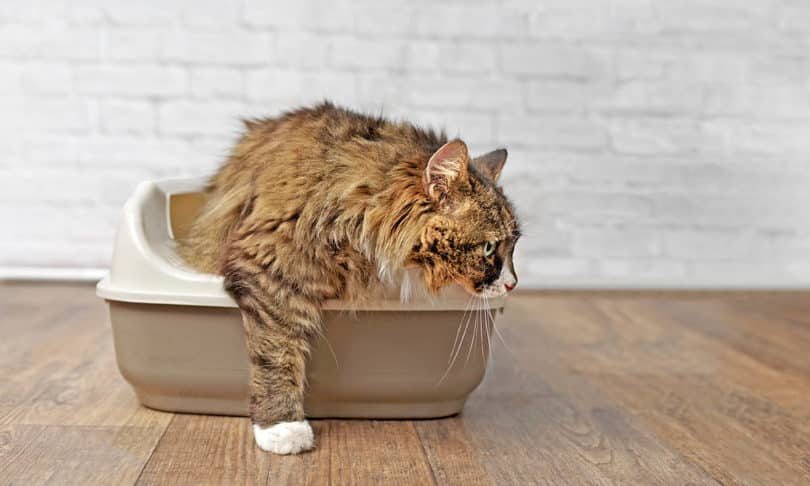
7. Marking Territory
Ah, yes—one of the worst smells on the planet is emanating from your shoes. As if it didn’t smell bad enough, right? Spraying typically happens once a cat reaches sexual maturity. Some cats never spray, while others always will, even after spaying or neutering.
You can tell cat spray apart from urine because it tends to be much stronger. Often, cats spray to mark their territory, letting other felines know this is their spot and they better back off. Or, they might be trying to attract a mate.
Regardless of the reason, it’s vital to get the smell out completely to end repeat offenses. If they still pick up on the scent, it might happen again (even if your human nose can’t detect it). If you haven’t yet spayed or neutered your cat, you’ll want to make an appointment with your vet right away.
Even though there’s no guarantee that they will stop entirely, it does have a high success rate of ending the problem. If your cat continues the behavior, you will need to find ways to curb its desire to mark.
Tips to Stop Your Cat From Peeing on Shoes
As with all problems, there are solutions. If your cat is peeing in your shoes, cover all of your bases.
- Try to find the root cause. You might have to investigate, but you need to see if you can figure out where the problem is coming from.
- Check for other spots your cat might be peeing, too. Shoes are an easy spot to notice since you put them on your feet. But other areas might be less noticeable. Make sure to check doorways, carpets, bathtubs, and beds, too.
- Keep your shoes out of reach. Make sure to stop the shoe issue by putting your sneakers away completely. They can’t pee on what they can’t see.
- Wash your soiled shoes in vinegar and baking soda. Once cats pee, they leave behind trace scents that we might not be able to smell—but they can.
- Don’t resort to harsh punishments. No matter how frustrating it is, please don’t take it too far when it comes to discipline.
- Consult a professional. You can seek help from veterinarians, cat behaviorists, and other professionals to get advice on the issue. Many people work diligently to improve cat behavior so that you can coexist peacefully inside the home.
An issue like peeing in shoes can cause a rift in your feline-human relationship. In some cases, if you can’t find a solution, you may think of rehoming your pet. Before you make any rash decisions, try to take all avenues to eliminate the problem.
You and your cat are a team—sometimes, you just have to bridge the communication gap.
How to Clean After Your Cat Pees in Your Shoes
Once you’ve addressed the behavioral issues, it’s time to start cleaning. You can use the old household staples like soap, water, and paper towels, but odors and stains may persist. You may even chose to run certain types of shoes through a laundry cycle. We like to use powerful enzymatic cleaners for the fastest and easiest stain and odor removal. Simply spray the affected areas of the shoe and wait.
- ADVANCED ENZYMATIC CLEANER - Penetrates the most stubborn smells and stains at the deepest molecular...
- FOR ANY MESS, ON ANY SURFACE - This pet odor eliminator cleans your carpets, floors, furniture,...
- FRESH, NATURAL ODOR - Our unique formulation doesn't rely on dangerous or unpleasant chemical...
The Hepper Advanced Bio-Enzyme Pet Stain & Odor Eliminator Spray is our favorite enzyme cleaner out there. It permanently removes even the very worst kitty stains and smells, leaving your home fresh and clean! Click here to learn more about this amazing product and get yourself a bottle.
At Catster, we’ve admired Hepper for many years, and decided to take a controlling ownership interest so that we could benefit from the outstanding products of this cool cat company!
Final Thoughts
Cat pee in your shoes can be a real pain, but try to work through the situation. It’s vital to understand that every bad behavior has a root cause. Once you uncover the problem, you can fix it for good. If you are having trouble or can’t seem to kick the issue, never hesitate to discuss other options with your vet.
There are plenty of resources to strengthen the human/cat relationship. After all, everyone in the home needs to be pleased, content, and comfortable—and we all know if the cat’s not happy, nobody’s happy.
Featured Image Credit: AJSTUDIO PHOTOGRAPHY, Shutterstock

